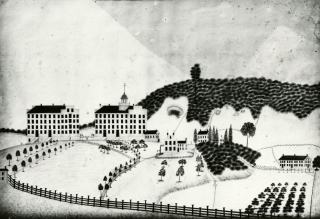Boarding Hall was erected on the site of the present Huntington Gymnasium, about a quarter of a mile down the Hill. All students ate there except those excused by the faculty. Some, no doubt, objected to the long walk, especially in winter, The chief cause of dissatisfaction, particularly in, the early 1840’s, seems to have been the food. Yet, in only one case of the many complaints reaching the faculty and Executive Committee is poor food specifically mentioned. In this instance, the authorities suspended a student for taking from the table a dish of meat which he considered offensive, instead of speaking to the Steward about it and then haranguing his fellow diners on, the subject when the Steward objected to his behavior. Students repeatedly asked permission, however, to board with private families, alleging as reasons, ill health or parental desire. Dr. Kendrick, who maintained that they had plenty of good food, thought that the real reasons were more often “Female society, and tea parties, and other village influences.” Usually these requests were refused. To have done otherwise would have meant keeping the Boarding Hall open. only for needy students.
Like most other American colleges of the period, the Hamilton Literary and Theological Institution, had an elaborate set of Laws, which were adopted in 1840 to regulate student behavior in minute

